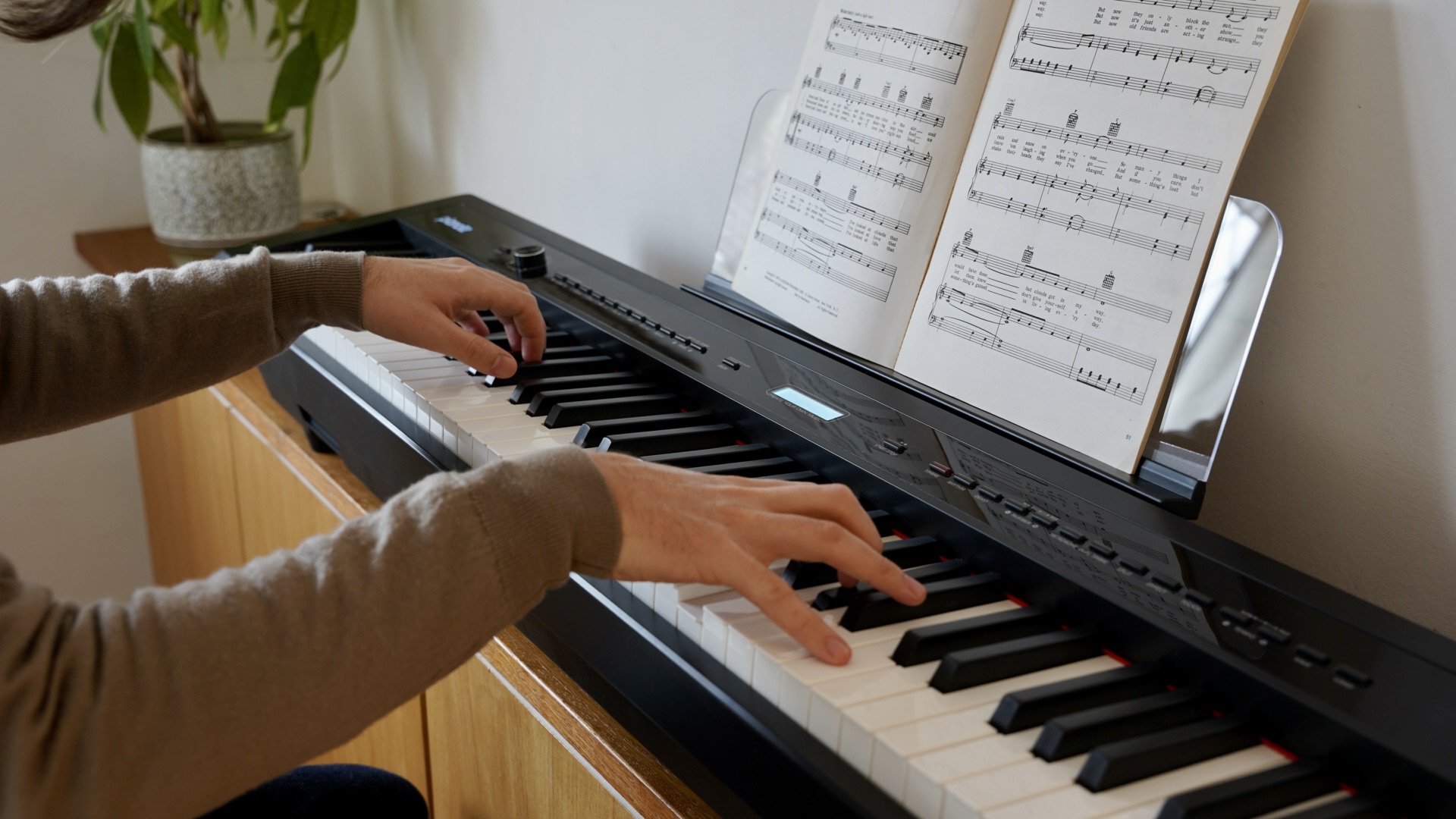MusicRadar Verdict
Pianote's entry into the digital piano world aims to complement its trusted learning ecosystem, making it a great choice for new or existing members. However, as a standalone beginner instrument, it struggles to distinguish itself. While the keyboard and speakers perform well, the Prima suffers from poor audio quality and lacks refinement or innovation. Ultimately, the overall package offers few distinct advantages, making it difficult to recommend over more established options in the beginner market.
Pros
- +
Excellent value for Pianote’s members
- +
Beginner friendly
- +
Expressive piano touch and speakers
- +
Easy connectivity
Cons
- -
Underwhelming sound quality
- -
Basic and unrefined
- -
Not competitive as a standalone
MusicRadar's got your back
What is it?
The Prima is the first piano designed by the online piano learning platform Pianote. If you’re unfamiliar with Pianote, they offer a subscription-based set of courses featuring their own unique piano learning method. It provides lessons from world-class instructors, including Victoria Theodore (Beyoncé’s keyboardist), internet sensation and jazz improvisation wizard Jesús Molina, and Jordan Rudess, the virtuoso behind Dream Theater’s legendary keyboard lines.
Their approach to piano learning focuses on building playing skills while nurturing musicality. It encourages exploration of various genres, composition, and songwriting and offers an extensive library of popular songs and diverse piano workouts. With the Prima, Pianote is now offering its own digital piano.
The Prima is a full 88-key beginner digital piano featuring fully weighted keys designed to replicate the feel of an acoustic piano. Its hammer-action keyboard offers a progressive response, with heavier keys in the lower register and lighter keys in the higher notes, just as they would on a traditional piano. This design should ensure a realistic playing experience, appealing to both beginners and experienced players alike.
Pianote’s venture into digital piano design is centred on creating an instrument tailored for beginners, equipped with all the essential features for effective learning. It offers seamless wireless connectivity for accessing Pianote lessons via tablets or phones, supports music streaming through built-in speakers or two headphone jacks for quiet play-along sessions, and includes classic customisable backing tracks to enhance the learning experience.
It’s lightweight and portable and comes with its own piano-style sustain pedal. The design features a classic layout, ensuring easy access to the piano’s functions through an intuitive arrangement of buttons. The Prima offers an extensive library of 238 sounds, including classic grand pianos, orchestral instruments, organs, modern synths, and percussion.
It can be purchased as part of a bundle offering an annual Pianote membership with access to everything the platform has to offer.
Performance & verdict
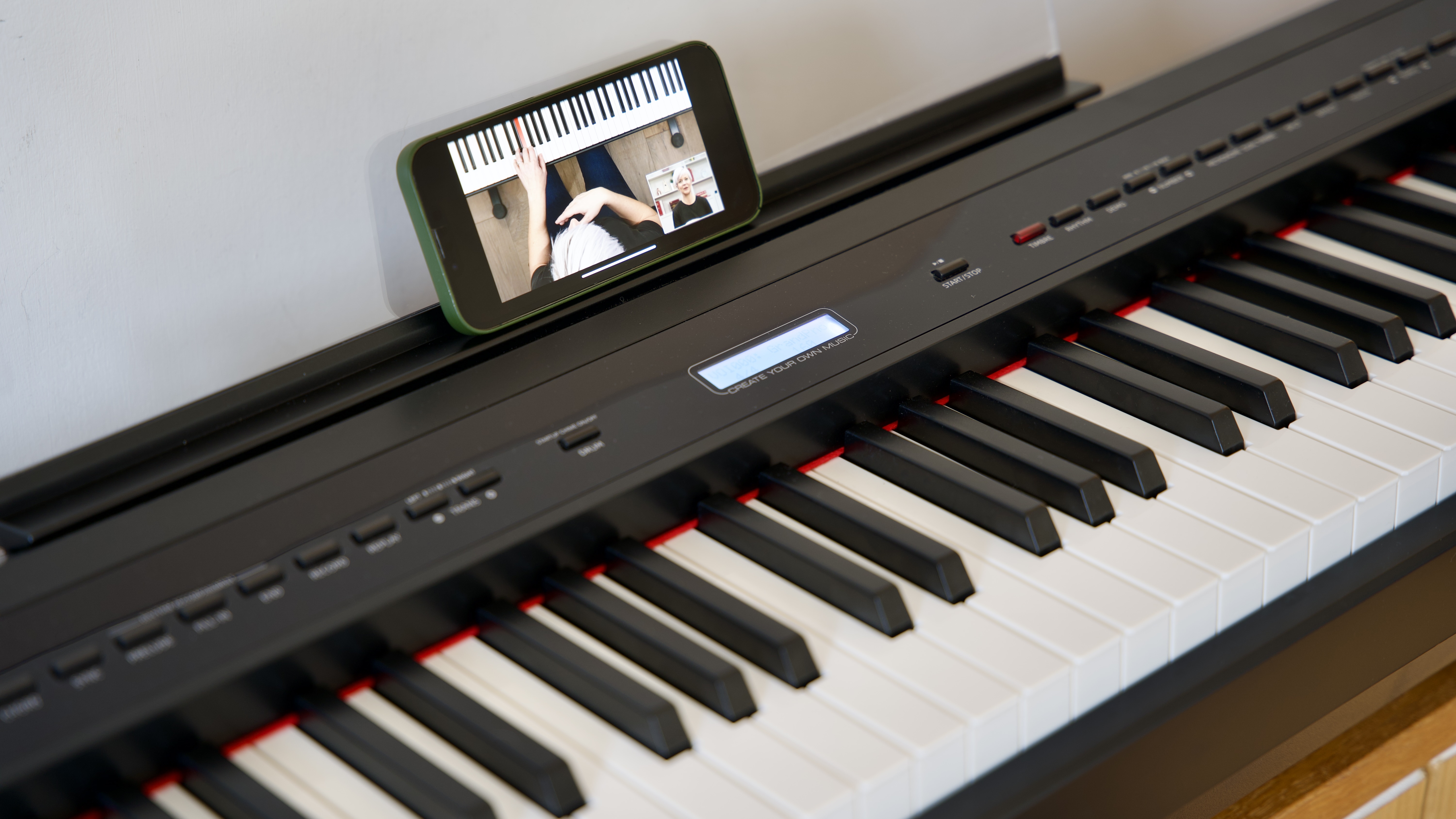
The engineers at Pianote have done a great job replicating the feel of an acoustic piano
The idea behind the Prima is exciting: a digital piano crafted by the minds behind a successful online piano learning platform. It represents a unique opportunity to create an instrument tailored to the specific needs of students, combining educational expertise with thoughtful, functional design.
Does the Prima bring anything truly innovative to the beginner digital piano market? Not really - unless you’re planning on becoming a Pianote member and following their course, where their bundle offers the piano at a very affordable price. While some features are impressive, they don’t surpass what competitors already provide.
It’s not all bad, the Prima has its strong points, with the keyboard being its most impressive feature. The engineers at Pianote have done a great job replicating the feel of an acoustic piano. The weighted action is realistic, and the progressive technology means the lower notes feel heavier than the higher ones, adding dynamic depth. This helps beginners build finger strength and develop the necessary articulation to play effortlessly on virtually any keyboard. However, the action is quite heavy, which may not suit everyone’s preferences and will require some adjustment.
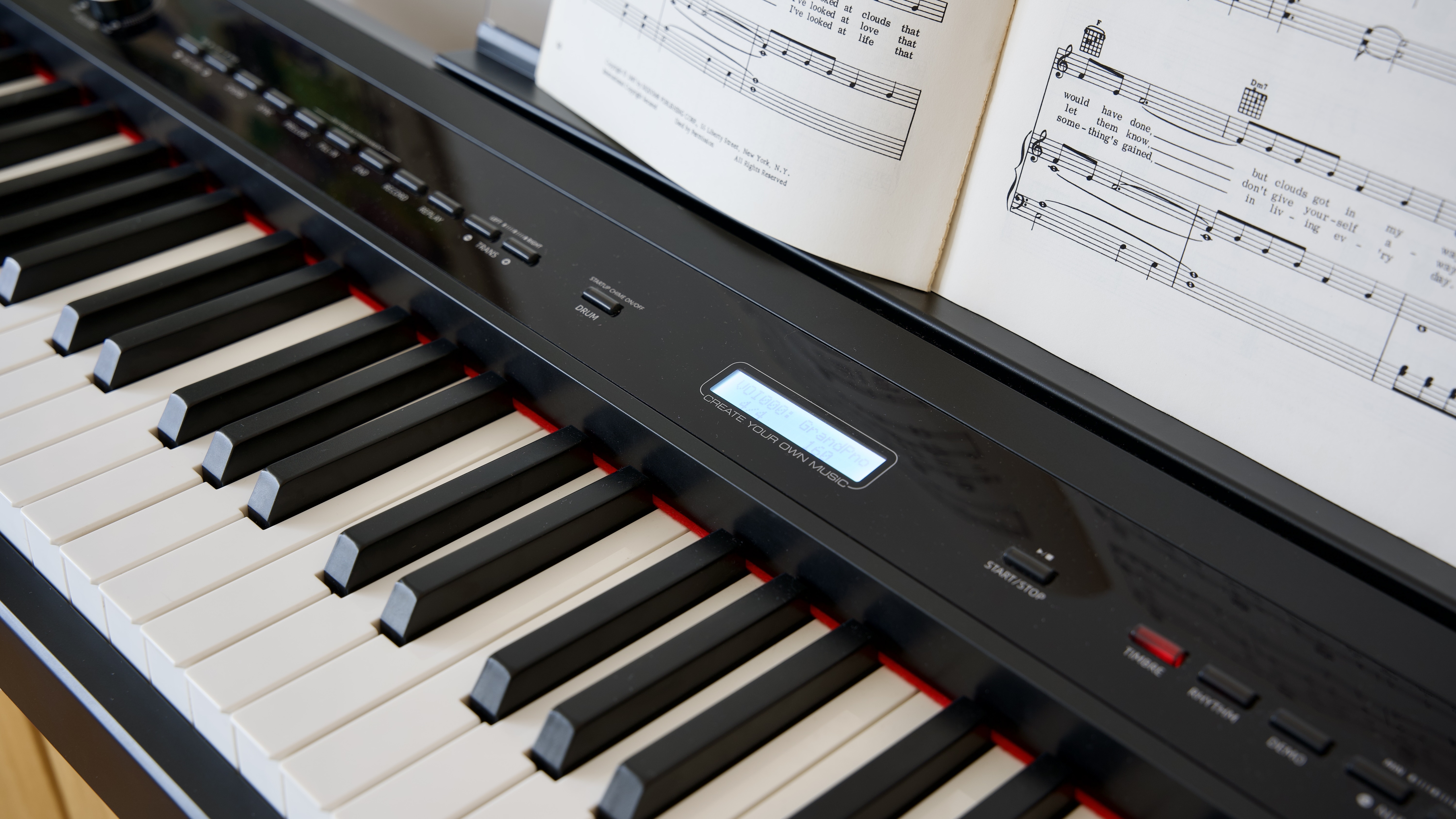
The Prima was thoughtfully designed with beginners in mind, offering an all-in-one setup
The design of this piano is simple and straightforward, with each button having a clear, defined function and intuitive setting navigation. However, the overall layout could benefit from refinement, especially considering the efforts of competitors to produce sleeker, more elegant instruments. The piano itself feels somewhat bulky, with a finish that lacks refinement and detracts from its overall aesthetic appeal.
The Prima was thoughtfully designed with beginners in mind, offering an all-in-one setup. It comes equipped with a sustain pedal and a 6.35mm (1/4 inch) jack adapter, making it simple to plug in any headphones or earphones right from the start. Its front panel includes two headphone inputs, allowing both the player and another listener, such as a teacher or parent, to engage simultaneously while keeping sessions quiet.
However, the pedal feels less durable than expected, raising concerns about its ability to withstand heavy use over time, particularly as it will endure regular foot pressure and movement. We recommend investing in a dedicated piano stand, as the Prima's size makes it impractical for standard desks or tables, which are likely to position it too high for comfortable playing.
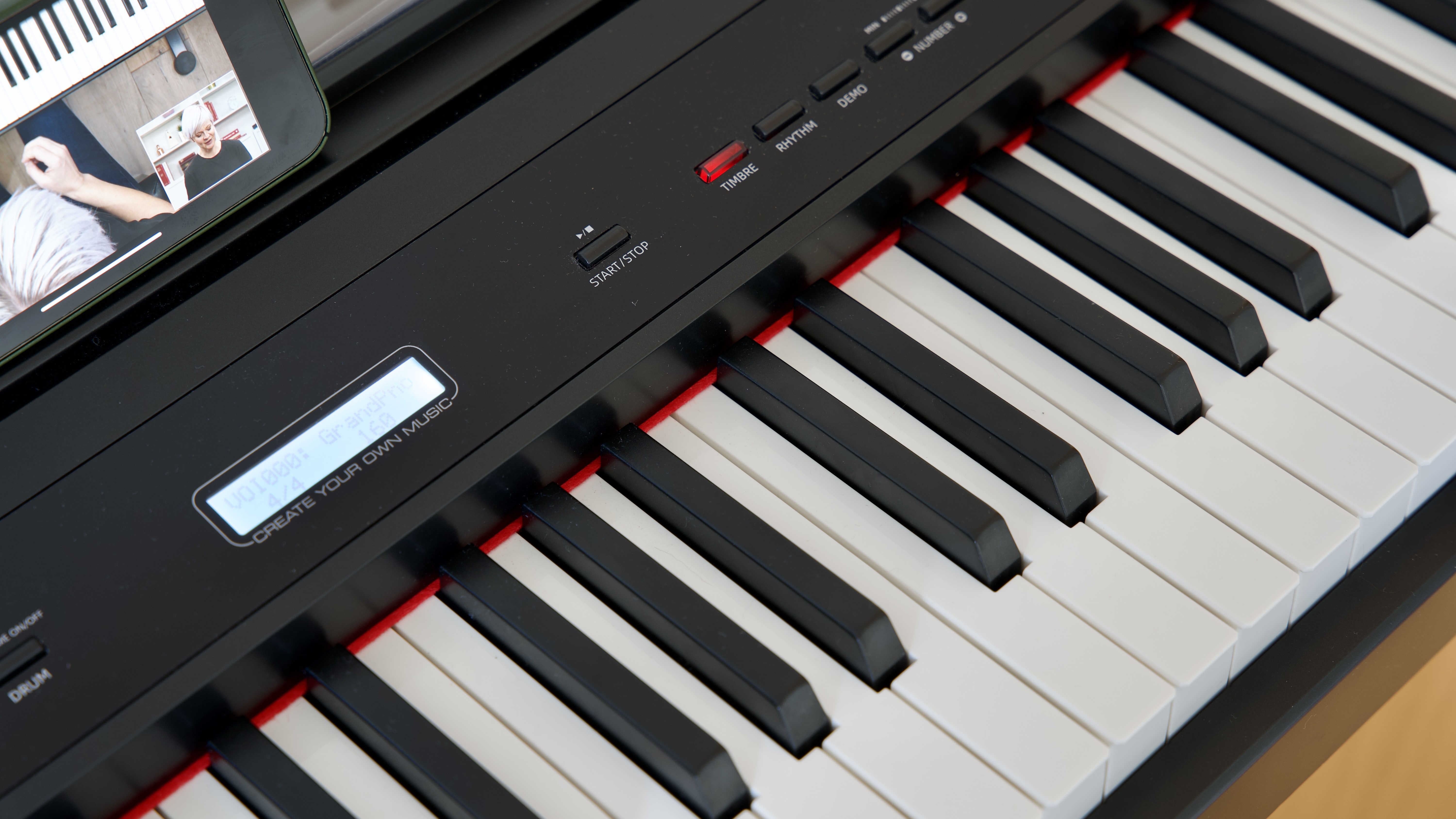
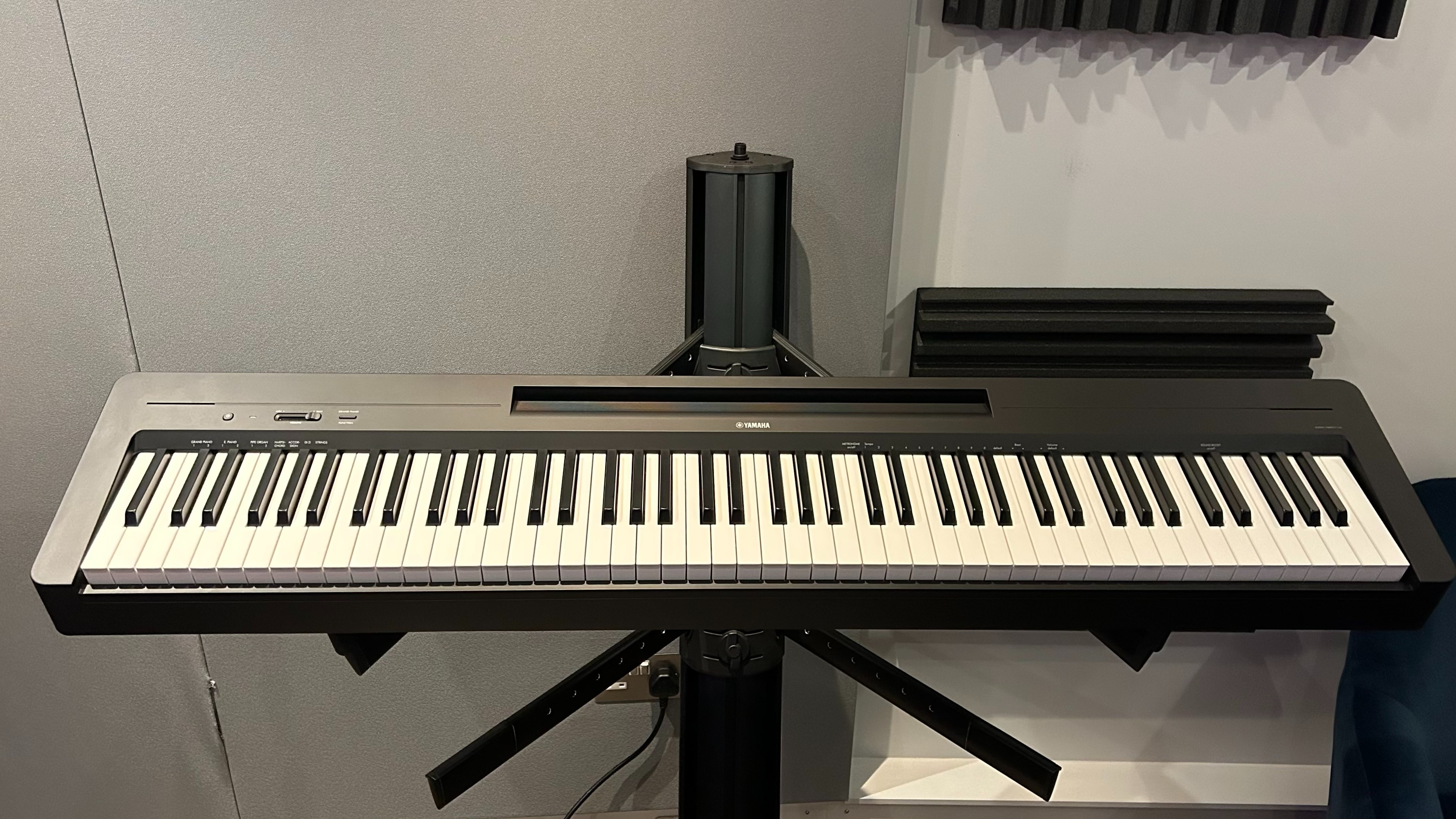
Casio PX-S1100: In our option, this is a well-built, highly playable stage piano that offers fantastic value for money.
Yamaha P-145: Robust, compact, and offering players an authentic feeling instrument at a stellar price, there is much to love about the Yamaha P-145.
Roland GO:PIANO 88: Combining the convenience and price point of a keyboard with the full-sized keys of a piano, the GO:PIANO is ideal for beginners.
On the positive side, we were pleasantly surprised by the sound quality of the Prima's speakers. They deliver impressive clarity and punch, providing a warm and organic sound diffusion that stands out. In fact, the performance rivals or even surpasses that of its direct competitors.
The biggest shortcoming of this instrument lies in its sounds and accompaniment backing tracks. While the 238 tones offer variety and fun, especially for young musicians, their quality feels outdated for 2024. The sampling lacks detail and doesn’t take full advantage of modern advancements.
Similarly, the backing tracks reminded us of the beats that were commonly found in keyboards from the 90s and 00s. This will appeal to younger children but teenagers and adults might find them uninspiring. Fortunately, Pianote's extensive online library of high-quality backing tracks for popular songs helps bridge this gap.
Final verdict

Pianote’s goal with releasing their first piano is to offer an affordable yet capable digital piano for learning. If you’re interested in joining their excellent learning ecosystem, this piano could be a worthwhile investment.
However, if you’re seeking an affordable digital piano that supports your learning journey and keeps you inspired, we recommend exploring options from more established piano makers.
While Pianote’s offering is interesting, the sound quality of both its tones and backing tracks feels underwhelming and uninspired. Nonetheless, we highly encourage visiting their website to explore their comprehensive learning experience.
Specifications
- Keyboard: 88 Keys - fully-weighted keys progressive lever hammer action
- Sound Source: Stereo speakers
- Number of Tones: 238 Built-in Sounds
- Dimensions: 1,393x295x190 mm (w/o music stand)
- Colour: Black
- Connectivity: Bluetooth, MIDI, USB
- Audio In/Out: 2x Headphones, audio out
- Metronome: Built-in Metronomes
- Included Accessories: True piano sustain pedal, jack adapter 6.35mm (1/4 inch), built-in music stand.
- Contact: Pianote
- Try Pianote for 30 days, absolutely free
Quentin is a composer specialising in writing for contemporary dance, theatre and film. He is also a classically trained pianist and multi-instrumentalist. One half of trip-hop duo Moon Thrills, Quentin also teaches songwriting to the undergraduate students at LCCM in London. He has a newly discovered passion for sound synthesis and finds it a great way to explore new and exciting ways to develop his music.
"Despite its size, it delivers impressive audio quality and premium functions as well as featuring a good selection of inspired sounds": Roland GO:Piano 88PX review
MusicRadar deals of the week: Enjoy a mind-blowing $600 off a full-fat Gibson Les Paul, £500 off Kirk Hammett's Epiphone Greeny, and so much more
